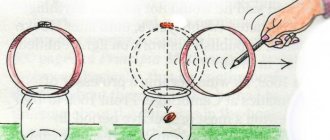We all have different characteristics of our nervous system. Each has its own advantages and disadvantages. The famous Russian physiologist I.I. Pavlov, continuing the works of Hippocrates, spoke of 4 personality types: strong unbalanced (choleric), strong balanced (sanguine), strong balanced inert (phlegmatic), weak unbalanced (melancholic).
In this material we will talk about what is an inert person like by nature?
Definition of inertia
So, inertia – what is it? This is the name of the property of the nervous system in which a person is extremely slowly drawn into work and gradually leaves it. Very often, inertia is accompanied by such qualities as apathy - indifference to both oneself and other people, developmental delay (which is observed very often). Inertia is characteristic of phlegmatic people. Inert people are stress-resistant, spend their energy measuredly, but can do one thing all day long. If there are three such cases, then the phlegmatic person must know about this in advance in order to distribute his forces to them.
Personal overcoming inertia
- Such people need to take up the business in which they are well versed and enter the work in which they are a “guru”. The principle of “a physicist among chemists” - then others will turn to him for help.
- If such people have no ideas, it will be useful for them to join a person who is obsessed with his dream. You can learn a lot from him.
- If life presents difficulties, you should not isolate yourself from them - you need to weigh everything and act. After the problem is solved, it is better to weigh everything again and check whether the result coincides with the expected reality.
- In speech, often use emotional expressions: “how wonderful,” “wonderful day.” It happens that feelings come with words.
Inertia in children
Inertness or slowness of mind, another synonym for inertia of thinking, is not always found exclusively in clinical cases. You can try for a long time to explain to your child that a whale is an animal, but using the experience he has already gained, he will insist that it is a fish and will not accept your words. You should not lose your temper; it is quite possible that the reason is not stubbornness, his behavior is characterized by inertia of thinking.
It is quite difficult for children to get used to new rules, to cope with volumes of information, and then they begin to act according to already established rules, ignoring the changed conditions.
How does inertia of thinking manifest itself?
There are many signs of an abnormal condition. Among these are:
Problems with analysis. Complex tasks pose great challenges to the subject. Everything that does not correspond to the established pattern of perception unsettles us. Examples of such inertia of thinking: a doctor is faced with a difficult clinical case. He is lost and cannot make a diagnosis because he is used to dealing with other pathological conditions. Or a law enforcement lawyer is invited to draft a regulatory legal act. This is a new activity that the subject has not previously encountered. Professional examples. The same can be found in everyday activities, everyday activities.
Narrowness of intellectual activity. The low level of competence is reflected. Tendency to do the same thing over and over again. Most often we are talking about a type of professional deformation. Especially if the subject works with routine things that do not in any way contribute to creative activity and development. This can happen in almost any type of activity.
Focus on other people's experience. Perceiving someone else's experience as absolute truth. In fact, we are talking about one of the possibilities. But a person perceives an isolated incident as a general pattern. This is a kind of paradox of thinking; inertia in this case is obvious. The only way to cope with such a situation is to analyze other opinions and formulate your own vision. You need skill and a certain degree of courage, a willingness to step over your own habits.
Lack of sufficient critical attitude towards the words and actions of others. A logical continuation of the previous manifestation. The words and opinions of other people are taken at face value. Especially if the speaker is an authority in his circle. There is always the possibility of a mistake or simple lack of professionalism on the part of the speaker. The subject does not take this into account and draws incorrect conclusions from the situation. We need to develop independence. This is the only way to deal with the problem.
Haste. Decisions are made as quickly as possible. Often - in order to save time. This has a detrimental effect on the problem and its solution. The subject identifies the first way to accomplish the task that comes to his mind. He is not always the most rational and correct. This is not taken into account.
Patterned intellectual activity. Typical for a person with the so-called excellent student syndrome. During school or university years, such a subject is inclined to make decisions based on its consequences, but not rationally. Thus, the problem will be solved in the way that the teacher prefers in order to receive praise. This approach has nothing to do with efficiency. Then this pattern is fixed and becomes habitual. It is possible to escape from the trap, but it will require a remarkable willpower. The same thing, conformity and submission, is demanded in the workplace. This can become an obstacle to normal development and conditional “cure”.
In some cases - the desire to stand out from the crowd. This has already been said. In such a situation, the wheel is reinvented.
You can cope with the inertia of thinking. It will take some time of self-improvement and hard work.
What to do if he is nearby?
So how do you understand that this is the kind of person in front of you? An inert person can be recognized by his behavior, by his actions. He is quite heavy to climb and in order to start doing any task he needs to tune in and swing. Such a person “flies in space”, he is apathetic to everything and does not worry about anything. An inert state makes him feel indifferent to what is happening around him. Life is easy for such people. Having experienced a stressful situation, they quickly forget about what is happening and do not torment themselves with memories, unlike active people.
Content
- Inert does not mean bad
- What to do if he is nearby?
- Don't give up and everything will work out
Greetings my dear readers! I hasten to share with you my observations and invaluable experience, which was very useful to me in my life and I am sure will be useful to you. There are many different types of people. Today I want to talk about one of them. So, what kind of inert person is this - we will discuss this topic with you today. I will help you identify such people and tell you how to behave with them.
Pesticides
US Federal Insecticide, Fungicide and Rodenticide Act (English)Russian. divides the ingredients in pesticides into two groups: active and inert. Chemically inert, in this context, are those that do not have a toxic effect on the specific species that the pesticide is intended to protect, but this does not exclude that they may still have biological activity on other species, including being toxic to person. In particular, solvents, propellants, preservatives, among other things, are considered inert ingredients. in pesticides.
Since 1997, the US Environmental Protection Agency has recommended that pesticide manufacturers label inactive ingredients
as "other ingredients" rather than "inert" to prevent misinformation to the public.
In Russian-language literature, the term inertia is used in works on pesticides, biotechnologies, as well as in official instructions for drugs, for example “Agropol”.
Inert does not mean bad
Before we start, I want to ask you. Does everyone understand what the word inert means? Because quite recently a young man who came to me for a consultation said that this was the first time he had ever heard such a word. As it turned out, he knew the definition, but did not think that it belonged to the field of psychology. Well, this happens, and there’s nothing wrong with it.
By the way, to get to know this concept better, it is not necessary to read specialized literature. There are books that talk about inertia in a fascinating way. I recommend John Strelecki’s work “Cafe at the End of the Earth. How to stop going with the flow and remember why you live.”
Since we are talking about people, and not about some chemical substances, I will give a definition about a person. An inert person, in simple words, is one who goes with the flow in life. He does not like to make responsible decisions; it is easier for him to carry out someone else’s instructions than to decide something himself. And he will cope with the task perfectly, even better than someone else. Such a person is often lacking initiative, but this does not mean that he is bad. He can be kind and very sensitive. He has a generous soul, he can give you his last, everything he has, be it a chocolate candy or love to the last drop.
Inert people
Who is this inert person? This is a type that does not show initiative in all areas of life. Such people always take a passive position, they are inactive, as if they are going with the flow, they do not want to change anything in their lives, they are afraid to take risks, shifting all responsibility to someone else. Also, people who are assigned an inert type constantly try to insure themselves against even the slightest mistake when solving problems, thereby slowing down the progress of their actions. In no case should depression be confused with this feature of the nervous system, since depression is a mental disorder.
Read also: Why is a starter needed in a car?
What is inertia?
Find out what awaits you today - Horoscope for today for all zodiac signs
Due to numerous requests from subscribers, we have prepared an accurate horoscope application for mobile phones. Forecasts will arrive for your zodiac sign every morning - it's impossible to miss! Download for free: Daily Horoscope 2020 (available on Android)
Inertia - what does this concept mean? It refers to the ability of the human nervous system to very slowly penetrate into the essence of what is happening, to get involved in the work process and also slowly exit it. As a rule, inertia is complemented by other characteristics, such as:
- apathy – that is, an indifferent perception of both oneself and others;
- slow development - however, this quality does not always occur.
If we consider the types of temperaments, then phlegmatic people are considered inert. Inertia – is it good or bad? Here, as they say, from which side you look. This condition has both its advantages and disadvantages.
The advantages are as follows:
- An inert person shows enviable resistance to stress, which is the envy of most choleric people.
- Knows how to spend his energy wisely, without wasting it.
- If he concentrates on one thing, he gives it all his attention, which ultimately allows him to achieve impressive results. But when giving such an employee several tasks at once, be sure to warn him about this, because he needs to correctly distribute his forces.
But it is not without its drawbacks:
- Who is this inert person? This is a person from whom it is impossible to expect initiative in any area of life. People of this type prefer to behave passively, inactively, “go with the flow”, not wanting to make any changes, and strive to shift responsibility onto the shoulders of others.
- They insure themselves in every possible way, even against minor mistakes, which slows down their actions even more.
Note! There is a big difference between depression and such an innate feature of the nervous system as inertia. While depression is a mental disorder, inert behavior may well be normal for a person.
Axial moment of inertia[edit
Axial moments of inertia of some bodies
The moment of inertia of a mechanical system relative to a fixed axis (“axial moment of inertia”) is the quantity Ja
, equal to the sum of the products of the masses of all n
material points of the system by the squares of their distances to the axis:
Where:
- mi
is the mass
of the i
-th point, - ri
— distance from
the i
-th point to the axis.
Axial moment of inertia Ja
Story
Ancient Greek scientists, judging by the works that have come down to us, reflected on the reasons for the commission and cessation of movement. In Aristotle’s “Physics” (IV century BC) the following reasoning about motion in emptiness is given:
| No one can say why, once set in motion, it will stop somewhere, for why is it more likely to stop here and not there? Consequently, it must either rest or move to infinity. |
However, another work, Mechanics, attributed to Aristotle, states:
| A moving body stops if the force pushing it ceases to act. |
Observations indeed showed that the body stopped when the force pushing it ceased. The natural opposition of external forces (friction, air resistance, etc.) to the movement of the pushed body was not taken into account. Therefore, Aristotle associated the invariability of the speed of movement of any body with the invariability of the force applied to it.
Only two millennia later, Galileo Galilei (1564-1642) was able to correct this error of “Aristotelian physics”. In his Discourses on Two New Sciences, Galileo wrote:
| ...the speed once imparted to a moving body will be strictly conserved, since external causes of acceleration or deceleration have been eliminated, a condition which is found only on a horizontal plane, for in the case of motion on an inclined plane downwards there is already a cause of acceleration, while in the case of motion on an upward inclined plane there is a deceleration; from this it follows that movement along the horizontal plane is eternal |
This judgment cannot be derived directly from the experiment, since it is impossible to exclude all external influences (friction, etc.). Therefore, here Galileo first used the method of logical thinking, based on direct observations and similar to the mathematical method of proof by contradiction. If the inclination of a plane to the horizontal causes the acceleration of a body moving downward along it and the deceleration of a body moving upward along it, then when moving along a horizontal plane the body has no reason to accelerate or slow down - and it must be in a state of uniform motion or rest.
Thus, Galileo simply and clearly proved the connection between force and change in speed (acceleration), and not between force and speed itself, as Aristotle and his followers believed. This discovery of Galileo entered science as the law of inertia
. However, Galileo allowed free movement not only in a straight line, but also in a circle (apparently for astronomical reasons). In its modern form, the law of inertia was formulated by Descartes. Newton included the law of inertia in his system of laws of mechanics as the first law.
Inertia Inert
Inertia as a personality quality is the tendency to switch from one type of activity to another with difficulty and slowly, to postpone most planned activities and start untimely, to remain inactive and inactive when life circumstances change.
One day, the Wise Pig stopped to stay with one of her many aunts, who lived with a poor and wicked peasant, ate from hand to mouth, and, moreover, often received beatings with a knotty stick. At the same time, one rich man bought a small herd of pigs for his tribe in the places where this story took place and was going to drive them to his own domain. He was a kind and generous man, he treated animals well and always preferred to sell or exchange them than to use them for meat, and therefore a better owner than him could not be found in the entire district. The Wise Pig learned about all this from a conversation with the watchdogs who protected the herd from wolves and thieves. She hurried to her aunt and began to persuade her to join the good man’s herd, but her aunt flatly refused. “Go if you want,” she said to her niece, “but I don’t want to trample my feet, and I’m used to it here.” They do not seek good from good. Likewise, many people often do not want to exchange a weed seed for a bag of rice. And as for our pigs, the stubborn aunt has long since died from hunger and beatings, while the Wise Pig, when not traveling, lives in the comfort of a kind owner, plays in the house and in the yard with his children, and in the evenings talks them a parable about a stubborn aunt.
Inertia is the daughter of ignorance. Put off, put off, not make a decision - this is her style. I’ll start doing it when I need it, it’s convenient, useful and profitable. However, this “when”, as a rule, never comes, and she has to be in the same company with inertia, laziness and stubbornness. Most people live inertly, thinking that life itself will change for the better without any participation of their mind. Therefore, the mind becomes slow, lazy and incapable of working on itself.
The human mind is inert by nature; it only wants to enjoy pleasure and dominate. For example, in the morning the mind tells the mind: “I need to take a contrast shower,” and the mind replies: “I’d rather drink a cold beer after yesterday.” The mind indignantly says: “Shut up! It is harmful". A dissatisfied mind reluctantly submits. The mind is aimed at decisive action, at fruitful life activity, and the mind is an inert force that does not want to do anything. Pleasures attract him like a magnet. Even happiness, by and large, does not attract him. The mind convinces the mind: “If you take a shower, you will feel cheerful, but beer will make your head hurt even more.” But the logic of the mind is primitive: give me pleasure this minute, and at least the grass won’t grow there. The inertia of the mind is overcome if it feels pleasure in a contrasting shower and displeasure in beer. This requires a long time and a revolution in consciousness. In other words, inertia is overcome when reason prevails over the mind and it realizes a new taste of happiness from an active life position instilled by reason.
People often attribute their unlucky lot to their bad character. But, of course, not all. The majority will find a lot of other culprits to justify themselves. But even the first ones show inertia of thinking. If you want to be happy, become it. If happiness is hampered by bad personality traits, cultivate virtues that neutralize vices. After all, goals are different. You can set a goal to buy an apartment, a car, a house, or you can set a spiritual goal - to cultivate certain virtues in yourself. Let's say a person is hampered by irritability. There is no need to fight vice. According to all the rules of goal setting (see the article “determination”), set yourself the goal of making calm, balance, goodwill and equanimity the manifested qualities of your personality. This will take time - six months or a year. Someone like. But as soon as these virtues become your qualities, you can forget about irritability forever.
Inertia should not be unconditionally classified as a vice. Sometimes it becomes the last bastion protecting a person's beliefs, beliefs and principles. The brain has the ability to retain information in memory for a long time, the usefulness of which is repeatedly confirmed by human practical activity. For example, perseverance in the fight for one’s beliefs is based on inertia of thinking as a property of the brain. If the beliefs were progressive, then such inertia can only be welcomed. But if a person’s beliefs become a brake on the path of progressive life changes, then inertia turns into an undoubted vice.
An inert person is apathetic and slow to move. He needs time to “wind up” and he needs to receive instructions. Women come to the rescue - they are more emotional and mobile people. Men are by nature more conservative and inert than women. It is no coincidence that most often family relationships are broken up on the woman’s initiative. An inert woman is a sad sight. Long-term communication with an inert woman does not give a man pleasure.
The Russian fabulist Ivan Andreevich Krylov combined inertia of character with laziness, which did not prevent him from being one of the first poets of Russia. His contemporaries told jokes about him, just as we now tell about Chapaev and Brezhnev. Once there was a fire in the house adjacent to Ivan Andreevich Krylov’s apartment. The servants, having informed Krylov about this, rushed to save various things and kept asking him to hurry up and collect his papers and valuables. But Krylov, not paying attention to the requests, screams and turmoil, remained lying on his favorite sofa. Moreover, Krylov ordered tea to be served and, after drinking it, slowly lit a cigar. Having finished with these matters, Krylov slowly got dressed, went out into the street, looked at the burning building and said: “That’s all...” With these words, Krylov returned to his apartment and lay down on the sofa again.
Krylov had a large painting in a heavy frame hanging above the sofa, where he usually lay. Someone noticed that the nail on which it was hung was not strong and that the painting might someday fall off and kill its owner. “No, you shouldn’t bother to outweigh,” Krylov lazily responded to the remark. - The painting hangs like this on purpose... The angle of the frame will in this case necessarily describe an indirect line and bypass my head...
Petr Kovalev Other articles by the author: https://www.podskazki.info/karta-statej/
Causes
Why do some people show inertia? Is this an innate quality, or was it acquired in adulthood? It should be noted here that there are two categories of people:
- The first group is phlegmatic by temperament, who are inert from birth, and for them this is a variant of the physiological norm.
- The second category is people whose inert behavior is caused by laziness and indecision. They simply cannot cope with the goals they have set for themselves, although there are no objective reasons for this.
It turns out that inertia has both personal and social significance.
Surely you have met the first category of citizens in your team. They are so slow that their slight lethargy can lead to a state of despondency, like a prolonged downpour in summer. Alas, they do this not out of malice, but simply have such a temperament.
By nature, they have a lack of vitality, and therefore do not show increased interest in the world around them. There is never a sparkle in their eyes, and there are no ambitions, goals or desires inside. But despite all this, they are not in a state of depression. And their world completely satisfies them.
It may sound a little rude, but I would like to draw an analogy with one African tribe of people who do not get their own food, but are accustomed to eating the gifts of the ocean washed up on the shore. They also collect the fruits of plants growing nearby. And the main part of their life passes in a state of sleep.
But there are also those individuals whose passivity is due to improper upbringing in the family. For example, the baby showed curiosity, but his eternal questions really annoyed the adults. And they tried to stop these attempts with the words “Leave me alone,” “Shut up,” “How long can you talk,” and the like.
Under the influence of such upbringing, the child became inert and began to show indifference to the world around him. Many representatives of the fairer sex who have this character go to work not because they dream of self-realization or money, but simply so as not to sit at home all the time.
How to deal with inertia
Here again we need to separate recommendations for innately inert people and those who are simply lazy and inactive.
What should those who are not passive, but simply lazy, do?
- Indecisiveness is usually caused by low self-esteem. Then it turns out that to eliminate this illness, a constant increase in self-esteem will be required. Tell such a person that everything will work out for him, that he is great. Praise in every possible way even for minimal achievements.
- And if criticism is strongly required, then express it in such a way that a passive individual can look at the situation from a different angle, drawing the right conclusions from it. Oppression is strictly prohibited, because how such a person will perceive unreasoned criticism is unknown.
Recommendations for “going with the flow”
If you are naturally an inert personality type, then it won’t hurt to listen to the following advice:
- Choose a job so that you can feel like a real professional. When other people continually ask for help, you will feel confident and can improve your self-esteem.
- Are you missing even the slightest inspiration in life? Absolutely nothing can arouse interest in you, ignite at least some emotions? Then it is recommended to find a person who is simply burning with a certain idea, and join him in his efforts. And even if you are not captured by the same passion as him, you can learn the most valuable skills from him. For example, learn how to make plans and their subsequent implementation, as well as enjoy the process.
- Sometimes life challenges each of us. It requires making certain efforts, going somewhere, getting out of your “shell.” There is no need to try to “bury your head in the sand.” To begin with, try to soberly assess what is happening according to criteria from zero to ten points, as difficult as this will be for you. But at the same time, do not forget about the pleasure received from the implementation of your plans. Many inert people tend to deliberately exaggerate problems, downplaying the joy of victory.
- Introduce expressions with a strong positive connotation into your speech: “wonderful,” “great,” “I really like it.” Psychologists say that our thoughts and words create our entire life. Therefore, at first you will simply start saying positive statements, and then you yourself will not notice that life around you has become brighter, richer, more interesting.
Chemistry
In chemistry, substances that are not chemically active are called inert.
Noble gases were previously known as noble gases
due to the supposed lack of participation in any chemical reactions. The reason for this is that their outermost electron shell (valence shell) is completely filled, so that they have little tendency to gain or lose an electron. It is now known that these gases react
with the formation of chemical compounds, for example, xenon tetrafluoride.
Therefore they were renamed noble gases
. However, such reactions require large amounts of energy, usually supplied in the form of heat, pressure, or radiation, and the presence of catalysts. The resulting compounds of inert gases are often unstable. Inert media consisting of gases such as argon or helium are widely used in chemical reaction chambers and reagent storage containers.
The term inert
can also be used in a relative sense, as non-reactive. For example, molecular nitrogen is inert under ordinary conditions existing in diatomic molecules, N2. The presence of a strong triple covalent bond in N2 molecules makes it non-reactive under normal conditions. However, nitrogen reacts with the alkali metal lithium to form lithium nitride (Li3N) even under normal conditions. At high pressures and temperatures and with the right catalyst, nitrogen becomes more reactive. The Haber process uses such conditions to produce ammonia from nitrogen in the air. Inert nitrogen media is widely used to store oxygen-sensitive or water-sensitive substances to prevent unwanted reactions of these substances with oxygen or water.
Don't give up and everything will work out
In conclusion, I will cite the real story of one woman who almost lost her loved one, but was able to win everything back in time. You won’t believe it, but the woman was forced to come to me for a consultation by her mother. The mother simply realized that her daughter was behaving incorrectly, or rather, not behaving at all towards the man. This girl was, by all indications, apathetic to everything, lethargic and lacking initiative. Her chosen ones were attracted by the stunning appearance of the girl; she had natural beauty by nature. But after a short period of time, any relationship failed. And only when she realized this herself, I was able to help her.
Together with her, we identified the gaps in her life model and were able to fill them, she put things in order in her head and freed up space for a new life. She threw away all those thoughts and fears that interfered with her and took away her strength.
Types of psychological inertia
There are many forms of the tendency to think in cliches.
- Extrapolation. The desire to transfer solutions to similar problems without taking into account the features of the plot. An exaggerated example: if an apple is green, then all fruits are green. Of course, this is not true. But in the paradigm of the named type of inertia, this is the truth.
- Analogy based on the functional orientation of the object. The habit that an object performs one task. For example, a knife cuts. The table acts as a support. The papers are secured with a paper clip.
- Traditionalism in the way the object is used. A similar type of phenomenon. The point is pretty much the same.
- Terminological traps. Terms that already exist contain in advance a way to solve a particular problem. A dropper is a medical product; its name indicates in advance the nature of its use, etc.
- Inertia of one decision. A way of thinking in which the subject chooses only the path that came to mind first. This is the most dangerous type of phenomenon.
There are many more types of psychological inertia. This is only part of the possible list.
Diagnosis of the condition
It is not so difficult to detect an abnormal condition, a distortion of cognitive activity. It is also possible to independently determine the change. But it takes a certain amount of courage to admit the problem. As for objective diagnostic methods, one cannot do without the participation of a psychologist.
There are practically no special questionnaires. And they are only suitable for initial examination. Assessment in the field is much more effective. That is, using a standard problem book. As a rule, it consists of 5 incidents that need to be resolved. Based on the results, one can judge the ability for rational, non-trivial thinking. The oral survey method is also used. It is important to identify the features of the conditional patient’s logic.
If there is evidence of impaired intellectual activity, you cannot do without consulting a specialist in psychotherapy or psychiatry. Depends on the situation. The goal is to identify the primary pathological process that interferes with normal activity.
Reasons for inertia of thinking
The pathological distortion of mental activity is due to several significant factors. It is worth saying more about them:
- Features of education
Oddly enough, this is one of the main reasons. Instilling interest in everything around you and spurring the creative development of a child is primarily the task of the parents themselves. You also need to set an example through your own actions. If this does not happen, the child becomes lethargic and lacking initiative. This is a natural phenomenon. Research shows that the same negative results are found with the imperative type of education. According to the model “I say, you do as told, period.” This approach kills interest in the world and makes the child absolutely obedient. It deprives you of the ability to act independently and teaches you helplessness.
- Tendency to trust others' word
As practice shows, this is a manifestation of conformism. The tendency to think and act like everyone else. To get an accurate picture of what is happening, a phenomenon or a process, you need to conduct a thorough analysis. If a person sees or thinks that he does not understand the issue enough, he would rather trust a competent specialist than start looking for a solution himself. The problem is that no one can check the level of professionalism of such a “specialist”. Accordingly, a person will perceive even false decisions as true and will rely on them. This is a very negative trait, so you need to fight it. Develop a healthy dose of distrust. This brings up another problem.
- Lack of sufficient critical eye
Lack of ability to question others' words, actions, or decisions. Develops as a trait inherent in conformists. This is associated with the perception of any information as true, without a shadow of a doubt. The trait is negative. The opposite phenomenon, the other extreme, is no less destructive. Stubbornness.
- Low creativity
Relatively rare. Every person has a creative spark, the only question is how to develop and fan it. Most don't strive for this. People are content with simple solutions and general answers. Upbringing and education have an impact. Inertia of thinking is a stereotypical trait. It deprives a person of individuality. Creativity can be developed. Really low potential can only happen if a person is sick. For example, congenital psychopathologies: oligophrenia, Down syndrome or other conditions of this kind that affect intelligence. Everything else is justification.
- Features of education
A cornerstone at the level of state and society. Western countries, like developed Asian countries, have moved away from traditionalism in education. They strive to develop a core skill - the ability to think and analyze. This happens everywhere: this model is typical for schools and universities. As for the countries of the former Union, conservative tendencies are still strong here. They teach you to memorize a large amount of information, unconditionally accept the teacher’s point of view, and suppress any initiative. Accordingly, young people do not adopt skills. They become walking relays of someone else’s opinion, someone else’s position and nothing more. This has implications on a global level. Entire societies are being formed that are prone to absolute submission, trusting propaganda and manipulation.
- Low propensity for cognitive activity and activity
It stems from laziness, unwillingness to work and study for the benefit of one’s own personality. Inertia of thinking is an inherent human trait. It can only be eliminated through continuous improvement. It is also necessary to obtain new information from several sources in order to form your own opinion and perception. When such incentives to stimulate intellectual activity are not enough, lack of initiative develops. It can also be an innate character trait.
- Psychopathological conditions
They are relatively rare, but they significantly affect the general condition of a person and his cognitive potential. This may include diseases such as mental retardation, schizophrenia, dementia, Down syndrome, and other conditions.
There are also less dangerous pathological processes. They are not so obvious, but have a great influence on the development of inertia in thinking. This can include depression. Depression puts an end to initiative. It becomes the brake that hinders the development of intelligence. Including due to apathy, unwillingness to do or undertake anything. The issue is decided not by a psychologist, but by a highly specialized specialist. Depends on the specific diagnosis. In the case of congenital or acquired persistent dementia, nothing can be done.
- Narrow outlook
Associated with insufficient cognitive interest and personality characteristics. You can cope with the situation, you just need to want to. Narrow outlook is associated with insufficient time that a person spends on his own development. The problem mainly lies here. The inertia of thinking gradually disappears when new paths and opinions are mastered.
- Save time
In some cases, the root of all troubles may be simple laziness. Reluctance to waste time searching for your own answer. This is also due to low cognitive activity and reluctance to perceive new information.
- Anxiety
Inertia of thinking, oddly enough, can be associated with an anxiety disorder. At the same time, a person may find the right, unusual solution, but he tries not to show his abilities, so as not to become an object of criticism. Or he strives for praise, knowing what decisions his superiors or teaching staff require of him. This is a negative trait and often goes hand in hand with social anxiety.
- Inability to take criticism
The softness and tenderness of the personality organization is reflected. It is necessary to separate criticism and personalization. In the countries of the former Union, it is more customary to get personal, to rudely upset and humiliate a person, and not his creations. Therefore, the tendency to tell it like it is is more widespread than in Western countries. This is due to the peculiarities of the organization of society, the mentality of people and methods of management and teaching. In fact, everything may be fine with cognitive abilities.
- Demonstrative behavior
The desire to stand out from the crowd with an original solution. The opposite phenomenon described above. In this case, the thinker literally reinvents the wheel. Instead of using available and effective tools, he tries to invent something of his own. It may well be that the problem is solved. But it is irrational and requires a lot of labor. Demonstrative behavior is typical for individuals with a narcissistic personality type.
Inertia of thinking is the desire to solve problems in old, stereotyped ways. The reasons are mainly psychological, related to the psychotype and development of the thinking subject. It is extremely rare that the factor concerns diseases.
Adaptation to the situation
Everyone knows that it's warm in summer? This is the pattern, the formula of nature's behavior. But can it be a cold day in summer? Yesterday we were still wearing light clothes, but today I want to wear something demi-season. Will everyone go to work insulated? No. Many do not have the courage or reaction to break the pattern. The day before yesterday it was warm, yesterday it was warm and today it should be warm - it’s summer. “Inert” individuals who think this way go outside and catch a cold. And the one who adapted and got dressed, saved on medicines, invested money in some new idea and got rich. Life took a different path, and it all began with adaptation to change through a break in the pattern. Do you have to be strong, very smart or lucky to dress warmly when it gets cold? No. So it is not the strongest and smartest who survive, but those who know how to quickly change behavior when the “weather” changes.
Unfortunately, few people in childhood are taught to keep their ears on top of their heads, to monitor where the wind is blowing and what the temperature is outside the window. Adults have more important things to do. For example, loading even more rigid patterns into children, like into a computer. Until the concepts of “what is good and what is bad” come out of the child’s ears. Life constantly throws up new facts that cannot be calculated with old formulas. So you shouldn’t “overdo it” with education either. Balance is the main thing here too.
A little warmth
In conclusion, we can say that inertia is not a disease, but a feature of the nervous system. All temperaments are different, but they can be combined. In the case of the type of nervous system, everything is different; you can be this or that. As for laziness, we must fight it, as well as fear, which gives rise to indecision. Of course, each personality type is good in its own way, as is the type of nervous system, but nothing is ideal. Remember, inert people really need emotional support, so if you know someone like that, it would be a good idea to periodically encourage him with warm words.
In conclusion
You can come to the logical conclusion of the topic. It turns out that inertia is not always a disease in psychology, but often it is simply one of the features of the nervous system. We are all different in our temperament, but we are not able to change this indicator.
Of course, in this case we are not talking about laziness. If you suffer from your own passivity, show apathy and do not want to make any efforts, you need to learn to work on yourself, on your complexes and fears, and get rid of indecision.
I would also like to note that for inert people, the emotional support of others is actually very important. Therefore, if you have such a person in your team or family, do not try to spread rot on him, try to encourage him at least from time to time, saying warm words.
And the following video will tell you even more information on the topic:











